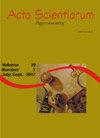Biochar as a soil conditioner for common bean plants
IF 1.2
4区 农林科学
引用次数: 0
Abstract
Biochar is a carbon-rich material produced during organic waste pyrolysis. In this context, two experiments were performed to evaluate the effect of biochar produced from rice husks and cattle manure on soil fertility and common bean production, as well as to identify the optimal dose of cattle manure biochar to be applied. The first experiment (Experiment I) was conducted according to a completely randomized design (factorial scheme 2 × 2 × 2 + 1) with six replicates: two types of biochar (cattle manure biochar and rice husk biochar), with and without acidity correction [addition of calcium carbonate and magnesium carbonate (PA) in a proportion of 4:1 (Ca:Mg) to raise the soil base saturation to 60%], with or without the addition of 120 mg dm-3 of phosphorus (P) as ammonium phosphate, and a control treatment (without biochar, acidity correction, and P). Based on the results of Experiment I, a second experiment was conducted according to a completely randomized design, with five treatments (doses of biochar from cattle manure) and four replications. Rice husk biochar, as a conditioner of soil chemical properties, had less prominent effects than cattle manure biochar. Cattle manure biochar functioned as a corrective for soil acidity and a source of nutrients (mainly phosphorus). The dose corresponding to 5.46% of the soil volume led to the maximum grain production by common bean plants.生物炭作为普通豆类植物的土壤调理剂
生物炭是有机废物热解过程中产生的富碳物质。在此背景下,进行了两项试验,以评估稻壳和牛粪生产的生物炭对土壤肥力和普通豆产量的影响,并确定牛粪生物炭的最佳施用剂量。试验1采用完全随机设计(因子方案2 × 2 × 2 + 1),共6个重复:两种类型的生物炭(牛粪生物炭和稻壳生物炭),有和没有酸度校正[添加碳酸钙和碳酸镁(PA)以4:1 (Ca:Mg)的比例将土壤碱饱和度提高到60%],有或没有添加120 Mg dm-3的磷(P)作为磷酸铵,以及对照处理(不加生物炭、酸度校正和P)。第二个试验采用完全随机设计,采用5个处理(牛粪生物炭剂量)和4个重复。稻壳生物炭对土壤化学性质的调节作用不如牛粪生物炭显著。牛粪生物炭作为土壤酸度的矫正剂和养分(主要是磷)的来源。当土壤体积的5.46%对应剂量时,普通豆科植物的粮食产量最大。
本文章由计算机程序翻译,如有差异,请以英文原文为准。
求助全文
约1分钟内获得全文
求助全文
来源期刊

Acta Scientiarum-agronomy
AGRONOMY-
CiteScore
2.30
自引率
0.00%
发文量
45
期刊介绍:
The journal publishes original articles in all areas of Agronomy, including soil sciences, agricultural entomology, soil fertility and manuring, soil physics, physiology of cultivated plants, phytopathology, phyto-health, phytotechny, genesis, morphology and soil classification, management and conservation of soil, integrated management of plant pests, vegetal improvement, agricultural microbiology, agricultural parasitology, production and processing of seeds.
 求助内容:
求助内容: 应助结果提醒方式:
应助结果提醒方式:


